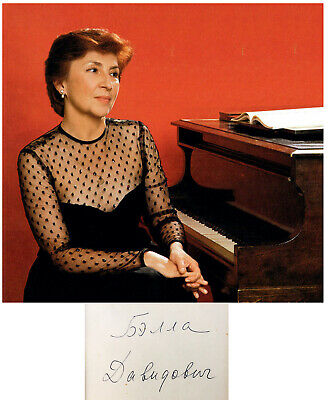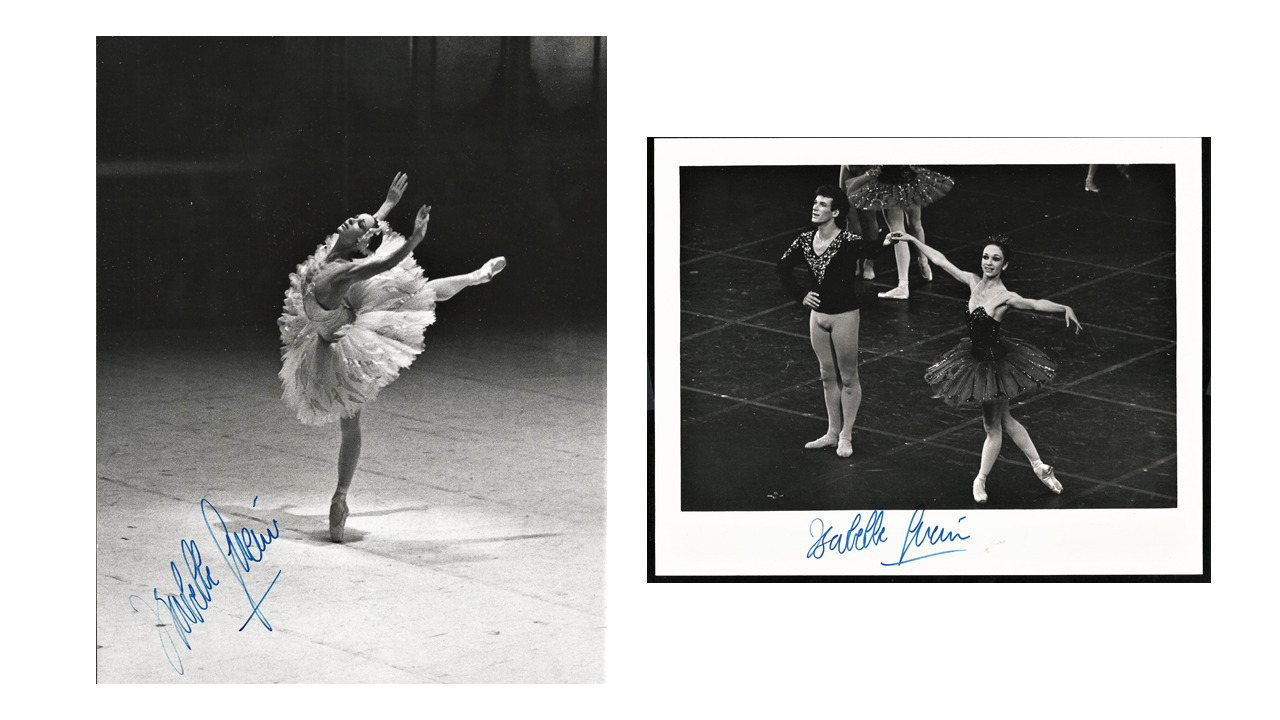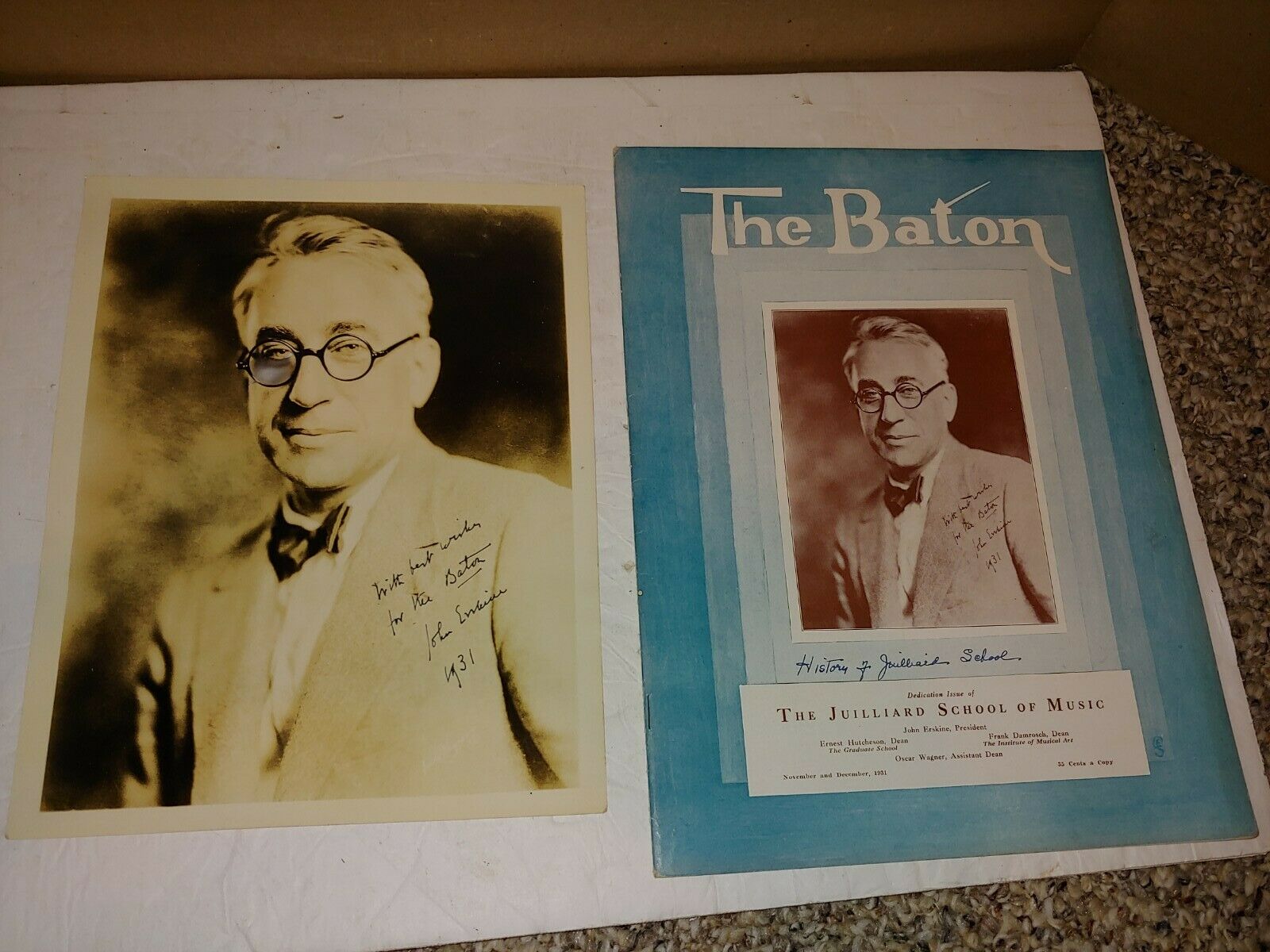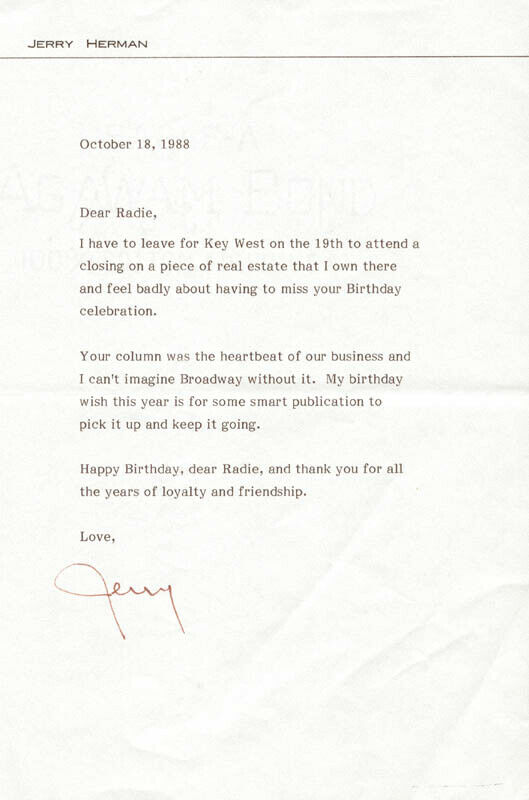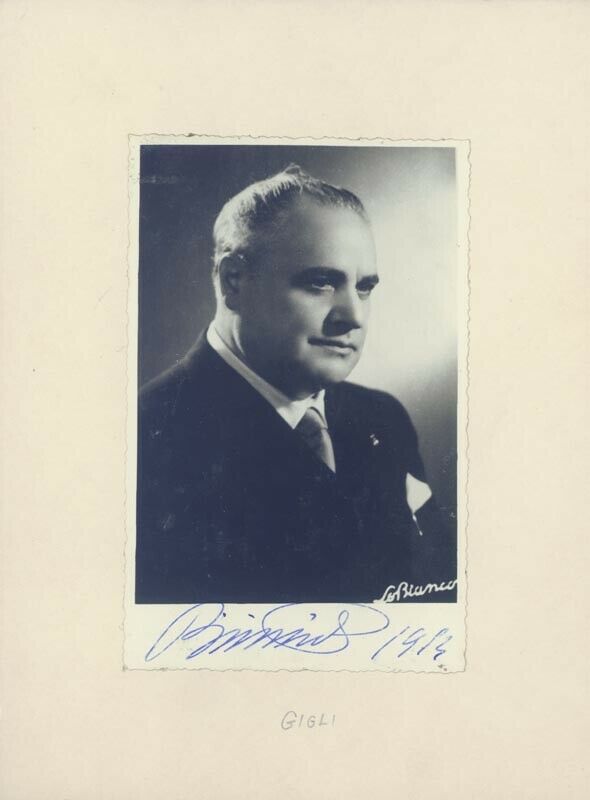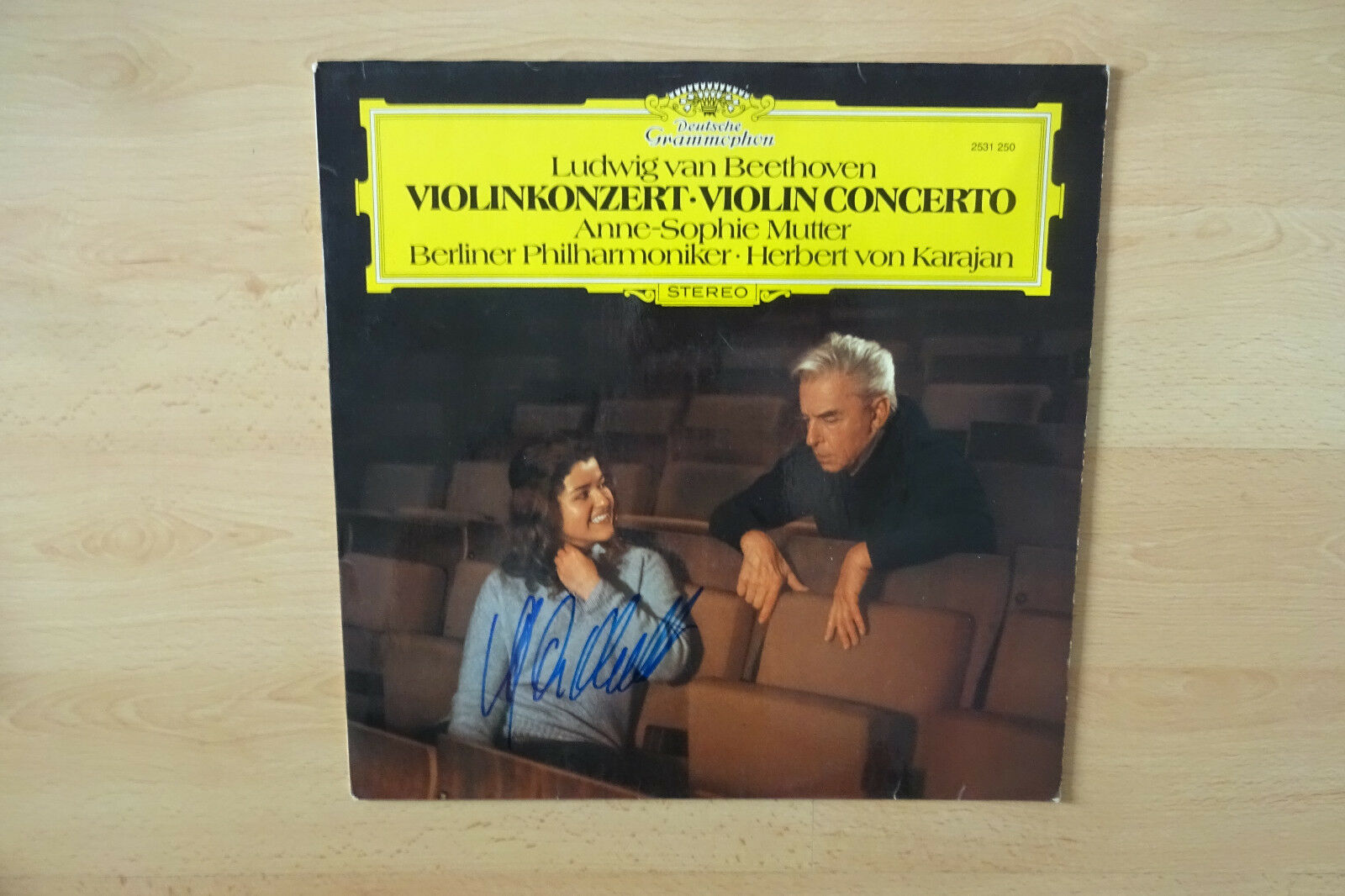-40%
RUSSIAN Pianist BELLA DAVIDOVICH Hand SIGNED AUTOGRAPH Piano PHOTO Jewish + MAT
$ 71.28
- Description
- Size Guide
Description
DESCRIPTION:
Up for auction is an original BEAUTIFULY HAND SIGNED in RUSSIAN and dated 1967 AUTOGRAPH - signature ( Signed with a blue pen ) of the
much beloved and admired female JEWISH PIANIST of RUSSIAN - SOVIET descent BELLA DAVIDOVICH ( DAVIDOVITCH )
, which is beautifuly and professionaly matted beneath her reproduction photo of young and handsome DAVIDOVICH at her piano.
In 1949 DAVIDOVICH won the INTERNATIONAL CHOPIN PIANO COMPETITION ( Together with Halina Czerny Stefanska ) .
The hand signed AUTOGRAPH - signature and the reproduction PHOTO are nicely matted together , Suitable for immediate framing or display . ( An image of a suggested framing is presented - The frame is not a part of this sale
-
An excellent framing - Buyer's choice - is possible for extra
). The size of the decorative mat is around 8 x 11.5 " . The size of the reproduction photo is around 5 x 6 " . The size of the original hand signed autograph ( Autogramme ) is around 3 x 3 " . Very good condition of the hand signed autograph, The reproduction photo and the decorative mat .( Pls look at scan for accurate AS IS images ) Authenticity guaranteed. Will be sent inside a protective rigid packaging .
PAYMENTS
:
Payment method accepted : Paypal .
SHIPPMENT
:
SHIPP worldwide via registered airmail is $ 25 . Will be sent inside a protective packaging.
Handling around 5 days after payment.
Bella Mikhaylovna Davidovich (Бэлла Миха́йловна Давидо́вич; born July 16, 1928) is a Soviet-born American pianist.[1] Davidovich was born in Baku, Azerbaijan SSR, into a Jewish family of musicians and began studying piano when she was six. Three years later, she was the soloist for a performance of Beethoven's Piano Concerto No. 1. In 1939, she moved to Moscow to continue her musical education. At the age of 18 she entered the Moscow Conservatory where she studied with Konstantin Igumnov and Yakov Flier. In 1949, she shared the first prize with Halina Czerny-Stefańska at the 4th International Frederick Chopin Piano Competition. This launched her on a career in the Soviet Union and Eastern Europe, in which she appeared with every major Russian conductor and performed as a soloist[2] with the Leningrad Philharmonic Orchestra for 28 consecutive seasons. She also taught at the Moscow Conservatory for sixteen years. She was married to violinist Julian Sitkovetsky. Their son, Dmitry Sitkovetsky, is a violinist and conductor. In 1978 she emigrated to the United States, where she became a naturalized citizen. She has taught at the Juilliard School in New York City since 1982. With the spirit of perestroika, she became the first Soviet émigré musician to receive an official invitation from the Soviet agency Goskoncert to perform in her native country. She played concertos, a recital with her son Dmitry Sitkovetsky playing the violin, and chamber music with the Borodin String Quartet to sold-out halls. **** Bella Davidovich began studying piano at the age of six. Her progress was so astonishing that by the age of nine, she had made her public debut performing a Beethoven concerto. In 1947, she enrolled at the Moscow Conservatory, where she studied under Konstantin Igumnov and Yakov Flier. In 1949, she won first prize in the Chopin Competition in Warsaw, establishing an active career as a soloist in the Soviet Union and Eastern Europe. In 1962, she became professor of piano at the Moscow Conservatory. Davidovich gave her first concert in Western Europe in 1967 (in the Netherlands) and in 1971, she was permitted to tour Italy. In 1977, her son, noted violinist Dmitry Sitkovetsky, defected to the United States, leading the Soviet authorities to cancel all of her foreign concert engagements. She herself was able to leave the Soviet Union in 1978 and became an American citizen six years later. She made her American debut at Carnegie Hall in 1979, and she soon became a much sought-after soloist in the United States, Canada, and Europe, noted for her interpretations of the Romantic repertoire. In 1983, she was appointed to a professorship at the Juilliard School. In 1988, she and her son returned to Russia as some of the first emigrés to be invited to perform there during Gorbachev's period of Perestroika. Davidovich has appeared as soloist with the world's leading orchestras, including the New York Philharmonic, the Philadelphia Orchestra, the Boston Symphony Orchestra, the Cleveland Orchestra, the Los Angeles Philharmonic, the National Symphony Orchestra, the San Francisco Symphony Orchestra, the Toronto Symphony, the Montreal Symphony Orchestra, the Detroit Symphony Orchestra, the Houston Symphony, and the Pittsburgh Symphony Orchestra. She has collaborated with the Borodin Quartet, Guarneri Quartet, and Tokyo String Quartet. She has also served on the juries of the Queen Elisabeth and Chopin International Piano Competitions. ***** BELLA DAVIDOVICH Pianist Before emigrating to the USA, Bella Davidovich was one of the Soviet Union's pre-eminent artists as well as one of the few women to be admitted to the inner circle of Russian cultural life. Born in Baku into a family of musicians she began her piano studies at an early age. At the age of 18 she entered the Moscow Conservatory where she studied with Konstantin Igumnov and Jakov Flier. In 1949 she won First Prize in the Chopin Competition in Warsaw. During her remarkable career in the former Soviet Union, Bella Davidovich appeared with every major Russian conductor and performed as a soloist with the Leningrad Philharmonic for 28 consecutive seasons. With the spirit of perestroika, she became the first Soviet emigré musician to receive an official invitation from the Soviet agency Goskoncert to perform in her native country. She played concertos, a recital with her son, the violinist Dmitry Sitkovetsky and chamber music with the Borodin String Quartet to sold-out halls. Since moving to the USA two decades ago, Bella Davidovich has established herself as one of her adopted country's most popular artists and is one of the few female pianists to achieve worldwide reputation. In October 1979 her American debut at Carnegie Hall before a standing-room only audience, heralded a new chapter in a career of major importance. Throughout her extraordinary career, Bella Davidovich has performed with the world's leading conductors, such as Semyon Bychkov, Sergiu Comissiona, James Conlon, Christoph von Dohnanyi, Charles Dutoit, Christoph Eschenbach, Neeme Järvi, Mariss Jansons, Kyrill Kondrashin, Alexander Lazarev, Raymond Leppard, Neville Marriner, Riccardo Muti, Eugene Ormandy, David Oistrakh, Mstislav Rostropovitch, Kurt Sanderling, Maxim Shostakovitch, Gerard Schwarz, Leonard Slatkin, Yevgeny Svetlanov, Yuri Temirkanov, Klaus Tennstedt, Michael Tilson Thomas, Edo de Waart and David Zinman. Past highlights of her manifold activities include concerts with the Rotterdam Philharmonic Orchestra under Eri Klas, the Radio Symphony Orchestra Stuttgart under Vladimir Fedoseyev and the Oslo Philharmonic Orchestra under Mariss Jansons, chamber concerts with her son Dmitry Sitkovetsky and the cellist David Geringas, a tour to the Far East with the St. Petersburg Philharmonic Orchestra under Yuri Temirkanov, a tour of Spain with the Ulster Orchestra under Dmitry Sitkovetsky, a tour with the Royal Scottish National Orchestra under Alexander Lazarev, numerous recitals in London, in Bochum at the Piano Festival Ruhr, at the Rheingau Musik Festival and the Attergauer Musiksommer and, most recently, her highly acclaimed performances at the Salzburg Festspielhaus. In November 1999 she had a tremendous success with recitals at the Concertgebouw Amsterdam and in Lisbon: "Bella Davidovich is the seductive teller of a story full of entanglements and secrets." At the invitation of the Concertgebouw in Amsterdam where she has been a frequent and well-loved guest, she celebrated her 70th birthday in July 1998 by way of two magnificent concert performances together with her son, friends and students. She subsequently performed together with Gidon Kremer, Frans Helmerson, Lars Vogt and many other instrumentalists at Isabelle van Keulen's chamber music festival in Delft where she has been a regular guest. To celebrate the 50th anniversary of her winning First Prize at the first Chopin Piano Competition in Warsaw back in 1949, the Piano Festival Ruhr invited her for an orchestral concert and a recital in 1999. In Rotterdam, she took over a recital from Maria Joao Pires at short notice with great success. Future engagements include recitals at the Piano Festival Ruhr, in Stettin, Madrid, Mallorca and Lugano, chamber music at the Rheingau Musik Festival as well as orchestral concerts in Amsterdam, with the Royal Liverpool Philharmonic Orchestra and the Orchestre National des Pays de la Loire under Hubert Soudant. Bella Davidovich was a member of the faculty of the Moscow Conservatory for sixteen years before moving to the West in 1978. As a highly regarded pedagogue, she now concentrates her teaching activities at the Juilliard School in New York. She is also a regular jury member at many of the world's major international piano competitions. In 1995 she served on the jury of the Queen Elisabeth Competition in Brussels, the Chopin Competition in Warsaw and the Clara Haskil Competition in Vevey/Switzerland. Bella Davidovich has recorded for Philips, Orfeo and Novalis. **** Bella Davidovich Pianist (1928-) Renowned pianist Bella Davidovich was born in Baku and began studying piano when she was six years old. Three years later, she accompanied the Philharmonic Orchestra performing Beethoven's First Piano Concerto. In 1939, she moved to Moscow to continue her musical education and in 1949 won First Prize at the Chopin Competition in Warsaw, an achievement that launched her on a very successful career in the Soviet Union and Eastern Europe. From 1950-78, she appeared as soloist with the Leningrad Philharmonic and also taught at the Moscow Conservatory (1962-78). In 1967 she made her first appearance outside the Soviet Union in Amsterdam but when her son, Dmitry Sitkovetsky, defected to the West in 1977, her concerts abroad were canceled. Eventually, she managed to join him in 1978 by emigrating to the U.S. where she became a naturalized citizen in 1984. In 1988, she returned to Russia with her son, being one of the first emigrés to be invited to perform there during Gorbachev's period of Perestroika. Davidovich continues her international performances and has taught at the famed Juilliard School of Music in New York City since 1982. In the summer of 1999, she returned to Baku to give Master classes to the young musicians there. What experiences and interests in childhood would you say shaped your life and career? I grew up surrounded by musicians. Everyone in my family was deeply involved in music except for my father, a distinguished surgeon in Azerbaijan. Both my mother and grandfather worked at the Opera Theater. Mom trained the vocalists and my grandfather played First Violin. Mom's students were always coming over to our house to practice. Also, radio had a great influence on me. Of course, in the beginning I couldn't read notes, but I used to listen and pick up the music by ear. When I was three and a half years old, I figured out one of Chopin's waltzes on the piano. When I was six, I joined a group of special talented children and began formal music education. At nine, I was soloist with Baku's Philharmonic Orchestra performing Beethoven's First Piano Concerto. At 12, we left Baku for Moscow so I could attend the Moscow Conservatory and study with Professor Konstantin Igumnov. A year later, World War II started and my family had to return to Baku as my father was mobilized to work as a surgeon in a military hospital there. My mom returned to her work at the Opera Theater. In 1946 I graduated from music school in Baku and again left for Moscow Conservatory. During my third year of studies there (1949), I was chosen to perform at the Fourth International Chopin Competition for Piano in Warsaw. I took First Place. My success in Warsaw was celebrated in Azerbaijan. During World War II, many cities of the USSR were under occupation and, of course, cultural activities came to a halt. However, Baku was able to maintain itself as a cultural center at that time. Concert halls were full. People were passionate about music. How was your own childhood different from that of kids growing up today? Today when I read the newspaper and watch TV, I get so disappointed hearing about the terrible things that the youth are involved in, especially in America. How is it that students bring weapons to school and shoot their teachers and classmates? How is it that girls get pregnant when they are 14-15 years old, give birth in school bathrooms and discard their babies in garbage cans? And drugs? When my son was growing up, I never heard of such things. Unfortunately, some young people misinterpret the word "freedom" and do whatever they please. I hope these things will change as time goes by. Of course, there are always very good schools and excellent opportunities for those who seek them. At the same time, I was overjoyed when I returned to Baku both in 1998 and again this year and witnessed the concert halls full of young people who had come to listen to classical music. It shows that Baku's youth are still interested in this form of music. I was thrilled to see it. What advice would you give to young people as they enter the 21st century? First of all, I wish them health. Let them be healthy. I hope there won't be wars in the 21st century. At the moment, there are so many hot spots in the world. Even though I'm living safely in a rich country like America, I get very sad when I read about Chechnya, Grozny and Makhachkala in the news. Those places are still so dear to my heart as I used to pass through them while traveling by train to Moscow. It's very disturbing to read that people are getting massacred in those places. We haven't been very lucky this century. There have been so many victims and hardships for people. I hope the 21st century brings peace to the world. As far as the youth are concerned, I would advise them to listen to music, especially quality music. It's so hard for me to understand contemporary Western music with electronic instruments. What would you say is your greatest achievement in life? What do you want to be remembered for most? The first important success in my life was winning the Chopin Competition. It gave me the possibility at the age of 21 to travel and perform all over the Soviet Union and abroad. That led to my coming to the United States where, at the age of 51, I made my debut at Carnegie Hall. Nobody had really heard me there but the Hall was sold out. This recognition created the possibility for me to perform with the best orchestras and musicians in the most important music halls of the world - Japan, Israel, South America, Europe and the States. It's very hard for me to name the most important performances I've given. I have a very large repertoire, including about 30 concertos for symphony orchestra and also perform with chamber orchestras, especially in the U.S. Bella Davidovich was interviewed by Vafa Mastanova in November 1999. ****Bella (Mikhaylovna) Davidovitch (russe : Бе́лла Миха́йловна Давидо́вич) est une pianiste soviétique puis américaine, née le 16 juillet 1928 à Bakou, en RSS d'Azerbaïdjan (Union soviétique). Sommaire 1 Biographie 1.1 Enfance et famille 1.2 Du conservatoire de Moscou au Concours Chopin (1946-1950) 1.3 Une première partie de carrière limitée à l’Europe de l’Est (1950-1978) 1.4 Une seconde carrière tardive à l’Ouest (1978-) 2 Répertoire et collaborations 3 Sélection discographique 4 Notes et références 5 Liens externes Biographie[modifier | modifier le code] Enfance et famille[modifier | modifier le code] Bella Davidovitch est née le 16 juillet 1928 à Bakou (RSS d'Azerbaïdjan, URSS) d’un père chirurgien et d’une mère professeur de chant. Son grand-père maternel était premier violon à l’Opéra de Bakou. Elle a commencé l’étude du piano à l’âge de 6 ans à l’école de musique pour enfants du conservatoire d’Azerbaïdjan (où son professeur était Maria Bykova)1. Elle a joué en concert le 1er concerto pour piano de Beethoven dès l’âge de 9 ans, avec l’Orchestre philharmonique du conservatoire. À 11 ans, elle se rend à Moscou pour poursuivre ses études de piano, mais sa famille est contrainte de rentrer à Bakou lorsque la Seconde Guerre mondiale éclate2. Du conservatoire de Moscou au Concours Chopin (1946-1950)[modifier | modifier le code] En 1946, diplômée du Conservatoire de Bakou, elle entre au conservatoire de Moscou à l’âge de 18 ans, où elle étudie dans les classes de Constantin Igoumnov puis, après la mort de ce dernier en 1948, dans celle de Yakov Flier1. En 1949, elle remporte le premier prix au 4e Concours International Frédéric Chopin à Varsovie (le premier d’après-guerre), ex-æquo avec Halina Czerny-Stefańska3. Une première partie de carrière limitée à l’Europe de l’Est (1950-1978)[modifier | modifier le code] En 1950, Bella Davidovitch se marie avec le violoniste Julian Sitkovetsky (mort d’un cancer en 1958). Deux ans plus tard naît leur fils Dimitri Sitkovetsky, futur violoniste et chef d’orchestre. Son premier prix au Concours Chopin marque le début d’une grande carrière, limitée toutefois à l’URSS et à l’Europe de l’Est, pendant presque 30 ans, pour des raisons politiques. Bella Davidovitch s’est produite pendant cette période avec tous les grands orchestres soviétiques, dont l’Orchestre Philharmonique de Léningrad, avec lequel elle joue pendant 28 saisons consécutives4. De 1962 à 1978, Bella Davidovitch enseigne le piano au Conservatoire Tchaïkovski de Moscou2. On compte parmi ses élèves les plus célèbres les pianistes Alexandre Paley5 et Svetlana Eganian6. Une seconde carrière tardive à l’Ouest (1978-)[modifier | modifier le code] En 1967, Bella Davidovitch donne son premier concert en Europe occidentale, à Amsterdam aux Pays-Bas. 4 ans plus tard, elle est autorisée à sortir d’URSS pour une tournée en Italie7. En 1977, son fils, Dimitri Sitkovetsky, lui-même violoniste et chef d’orchestre, quitte l’URSS pour les États-Unis. Le pouvoir soviétique empêche alors Bella Davidovitch de se produire à l’étranger pendant 1 an et annule ses tournées en Italie et aux Pays-Bas. En 1978, Bella Davidovitch quitte à son tour l’URSS pour les États-Unis8 ; elle est naturalisée américaine en 1984. En 1983, elle devient professeur à la Juilliard School of Music de New York7. À partir de 1978, elle se produit régulièrement dans de nombreuses salles de concert en Amérique et en Europe (et notamment à Carnegie Hall, où elle obtient un grand succès en 1979). C’est à cette date que débute sa carrière internationale, hors l’Europe de l’Est. À la faveur de la Perestroïka, elle se produit de nouveau en Russie à partir de 1988 ; elle est à cette occasion, l’une des premières artistes russes à être invitée à se produire dans son pays d’origine2. En 1999, elle retourne dans sa ville natale, Bakou, où elle aura l’occasion de donner des Masterclasses à de jeunes musiciens locaux. En août 2003, deux concerts sont donnés au Concertgebouw à Amsterdam pour le 75e anniversaire de Bella Davidovitch, auxquels participent notamment Bella Davidovich elle-même et son fils Dmitri Sitkovetsky1. Bella Davidovitch a été membre du jury de plusieurs concours internationaux de piano, parmi les plus prestigieux, parmi lesquels le Concours Reine Élisabeth de Belgique, le Concours Chopin de Varsovie (1995 et 2010), le Concours Clara Haskil à Vevey (Suisse)4, le Concours international de musique de Genève (en 2005 et 2008)9 et le Concours Ferruccio Busoni à Bolzano (Italie)10. Répertoire et collaborations[modifier | modifier le code] Cet article ou cette section cherche trop à mettre son sujet en valeur en recourant immodérément au name dropping. Or, la notoriété des sujets cités ne se transmet pas automatiquement à celui de cet article (novembre 2020). Modifiez l'article pour adopter un ton neutre ou discutez-en. Bella Davidovitch a beaucoup joué le répertoire romantique, tout particulièrement Chopin qu’elle affectionne et dont ses interprétations sont particulièrement appréciées. Elle a également joué à de nombreuses reprises Haydn, Beethoven, Saint-Saëns ou Grieg. Bella Davidovitch a joué avec de nombreux chefs d’orchestre, parmi lesquels Semyon Bychkov, Sergiu Comissiona, James Conlon, Christoph von Dohnanyi, Charles Dutoit, Christoph Eschenbach, Kirill Kondrashin, Raymond Leppard, Neville Marriner, Eugene Ormandy, Mstislav Rostropovitch, Riccardo Muti, Leonard Slatkin, Edo de Waart1, Kurt Sanderling, Maxime Chostakovitch, Yuri Temirkanov, Ievgueni Svetlanov, Klaus Tennstedt, Michael Tilson Thomas, Neeme Järvi, David Oïstrakh4, Vakhtang Jordania, Alexander Lazarev10, Rudolf Barshai, Mariss Jansons, Kurt Masur et David Zinman9. Elle s’est produite avec les plus grands orchestres américains et canadiens : l'Orchestre philharmonique de New York, l'Orchestre de Philadelphie, l'Orchestre symphonique de Boston, l'Orchestre de Cleveland, l'Orchestre symphonique de San Francisco, l'Orchestre philharmonique de Los Angeles, le National Symphony Orchestra, le Toronto Symphony, l’Orchestre symphonique de Montréal, l'Orchestre symphonique de Seattle, l'Orchestre symphonique de Detroit, le Houston Symphony et l'Orchestre symphonique de Pittsburgh7. Mais aussi au Japon, en Israël et en Amérique du Sud. En Europe, elle a également donné des concerts avec l'Orchestre philharmonique de Rotterdam sous la direction de Eri Klas, l'Orchestre symphonique de la Radio de Stuttgart sous la direction de Vladimir Fedoseyev, avec l'Orchestre symphonique d'Islande4, avec l'Orchestre royal du Concertgebouw d’Amsterdam9 et avec l'Orchestre symphonique d'Oslo4 sous la direction de Mariss Jansons, avec l’Orchestre du Gewandhaus de Leipzig. Bella Davidovitch s’est produite en tournée avec l'Orchestre philharmonique de Saint-Pétersbourg sous la direction de Yuri Temirkanov4, et avec l'Orchestre national royal d'Écosse sous la direction d’Alexandre Lazarev10. Bella Davidovitch a également participé à des concerts de musique de chambre avec son fils Dmitry Sitkovetsky et le violoncelliste David Geringas. Elle a collaboré avec le Quatuor Borodine4. En 2010, on a pu l’entendre avec son ancien élève Alexandre Paley et l’Orchestre symphonique de Montréal dans le concerto pour deux pianos de Mozart. Sélection discographique[modifier | modifier le code] Chopin : Concerto pour piano n° 2 et Rondo à la Krakowiak, avec le London Symphony Orchestra, dirigé par Sir Neville Marriner (Philips, 1979 et 1990) Chopin : Concertos pour pianos n° 1 et 2, avec le London Symphony Orchestra, dirigé par Sir Neville Marriner (Philips, collection Eloquence, 1979, 1998 et 2009). Chopin : 24 Préludes (Philips, 1979) Beethoven : sonates pour piano n° 14 (Clair de Lune) et 18 (Philips, 1979) Schumann : Carnaval Op. 9, Humoreske Op. 20 (Philips, 1981) Ravel : œuvres pour violon et piano, avec Dmitry Sitkovetsky (Orfeo, 1984 et 1994) Grieg : sonates pour violon et piano, avec Dmitry Sitkovetsky (Orfeo, 1984 et 1993) Brahms : sonates pour violon et piano, avec Dmitry Sitkovetsky (Novalis, 1987 et 2001) Saint-Saëns : Concerto pour piano n° 2 et Rachmaninov : Rhapsodie sur un thème de Paganini, avec l’Orchestre du Concertgebouw d’Amsterdam, dirigé par Neeme Järvi (Philips, 1990) Chopin : 24 préludes, Polonaise Op. 40 n° 2, Rondeau Op. 16 et Barcarolle Op. 60 (Philips, 1990) Chopin : 4 Ballades, 4 Impromptus (Philips, 1992 puis Newton Classics, 2011) Schumann : Concerto pour piano Op. 54, avec l’Orchestre symphonique de Seattle, dirigé par Gerard Schwarz (Delos Records, 1995) Haydn : Concerto pour piano Hob. XVIII 11, Concerto pour violon, piano et orchestre à cordes, Hob. XVIII 6, avec Vaclav Hudecek et l’Orchestre Philharmonique de Chambre de Prague, dirigé par Dmitry Sitkovetsky (Supraphon, 1997) Grieg : Concerto pour piano Op. 16, avec l’Orchestre symphonique de Seattle, dirigé par Gerard Schwarz (Delos Records, 2000) Chopin : Ballades, Impromptus, Préludes (Brilliant Classics, 2007) Chopin : Concerto pour piano n° 2, avec l’Orchestre symphonique de Moscou, dirigé par Kirill Kondrachine (Melodiya / Music Online, 2007) Mendelssohn : Concerto pour piano Op. 25, avec l’Orchestre de chambre de Moscou, dirigé par Constantine Orbelian, et Chausson : Concerto pour piano, violon et cordes, op. 21, arr. Dmitri Sitkovetsky, avec l’Orchestre de chambre de Moscou, sous la direction de Dmitri Sitkovetsky – Jubilée – Concert pour le 80e anniversaire de Bella Davidovitch (Delos Records, 2008) Prokofiev : Roméo et Juliette, Sonate pour piano n° 3 Op. 28 et Scriabine : Sonate, Valse, 2 Poèmes, 3 Mazurkas (Philips) . EBAY5449
